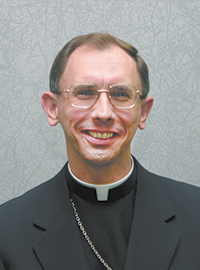 CNH: With people around the world beginning to get vaccinations against COVID-19 – including both Pope Francis and Pope Emeritus Benedict XVI – are you hopeful churches will soon be able to return to normal?
CNH: With people around the world beginning to get vaccinations against COVID-19 – including both Pope Francis and Pope Emeritus Benedict XVI – are you hopeful churches will soon be able to return to normal?
Bishop Jugis: We are all thankful for the availability and benefits of the vaccines. It has been a difficult year for everyone and people are looking forward to getting back to church, particularly with Holy Week and Easter just a few weeks away. Our churches will continue their operations with limits on capacity and safety measures in place, until we believe based on health experts’ guidance it is safe to resume normal operations. We pray that will be soon.
CNH: Some people have raised concerns about vaccines developed using cell lines derived from abortions that occurred decades ago. Do you share those concerns?
Bishop Jugis: First, let me say it is encouraging to see the faithful’s sensitivity to this moral question. This is a sign that the Gospel of Life is forming their consciences. Because our lives are a gift from God, we have an obligation to take care of them. That is the very goal of a vaccine.
Questions about the origin of vaccines are not new since the fetal cell lines you reference have been used in the testing and production of other vaccines. The moral concern people have is whether they are somehow complicit in an act of abortion by receiving a vaccine developed using cell lines distantly linked to an abortion. In this instance, the answer is no. The Church teaches that a vaccine recipient’s participation in the act of abortion would be passive, material and remote. In other words, someone who receives a COVID-19 vaccine would not be morally complicit in the original act of abortion. Nevertheless, we do have an obligation to speak out against moral evils that have been woven into the fabric of our society, as in this case, the abortions used to initiate some of the cell lines that remain in use today.
CNH: Which vaccine should people consider getting?
Bishop Jugis: Whenever possible, it is best to choose a vaccine that is ethically produced, and it is important to note that most of the COVID-19 vaccines in development do not use fetal cell lines at all. Of the three vaccines currently available in this country, the U.S. Conference of Catholic Bishops has recommended, “If one has the ability to choose…, Pfizer or Moderna’s vaccines should be chosen over Johnson & Johnson’s.” This is because the cell lines derived from aborted tissue were used in the production of the Johnson & Johnson vaccine, while the other two vaccines used those cell lines only in some laboratory testing. However, if you aren’t certain you can get access to the preferred options, it is acceptable to get the Johnson & Johnson vaccine given its remote connection to abortion. And the conference of bishops has said getting the vaccine “is an act of charity that serves the common good.”
CNH: If the connection to abortion is remote, why are some bishops raising concerns about vaccine production?
Bishop Jugis: They are reminding us that one cannot in good conscience just receive the benefit of a vaccine and then ignore the ethical problems associated with its development and production. We have a responsibility to press government, public health authorities and manufacturers to develop and provide ethically-produced vaccines.
CNH: What if someone does not want to take any vaccine?
Bishop Jugis: Vaccination must be a voluntary decision. The Congregation for the Doctrine of the Faith guides that, “From the ethical point of view, the morality of vaccination depends not only on the duty to protect one’s own health, but also on the duty to pursue the common good.” For those who refuse vaccines for moral or other reasons, the Congregation urges that they “do their utmost” through their behavior to avoid spreading the virus. “In particular,” the Congregation said, “they must avoid any risk to the health of those who cannot be vaccinated for medical or other reasons, and who are the most vulnerable.”
Quick-read summary: “Answers to Key Ethical Questions About COVID-19 Vaccines”
Compare the vaccines:  "Analysis of COVID-19 Vaccine Candidates," by the Charlotte Lozier Institute
"Analysis of COVID-19 Vaccine Candidates," by the Charlotte Lozier Institute
Call an ethicist: National Catholic Bioethics Center hotline
Learn more
- “U.S. Bishop Chairmen for Doctrine and for Pro-Life Address the Use of the Johnson & Johnson Covid-19 Vaccine,” U.S. Conference of Catholic Bishops, March 2, 2021
- “Note on the Morality of Using Some Anti-Covid-19 vaccines,” Congregation for the Doctrine of the Faith, Dec. 17, 2020
- “Moral Reflections on Vaccines Prepared from Cells Derived from Aborted Human Foetuses,” Pontifical Academy for Life, June 9, 2005


